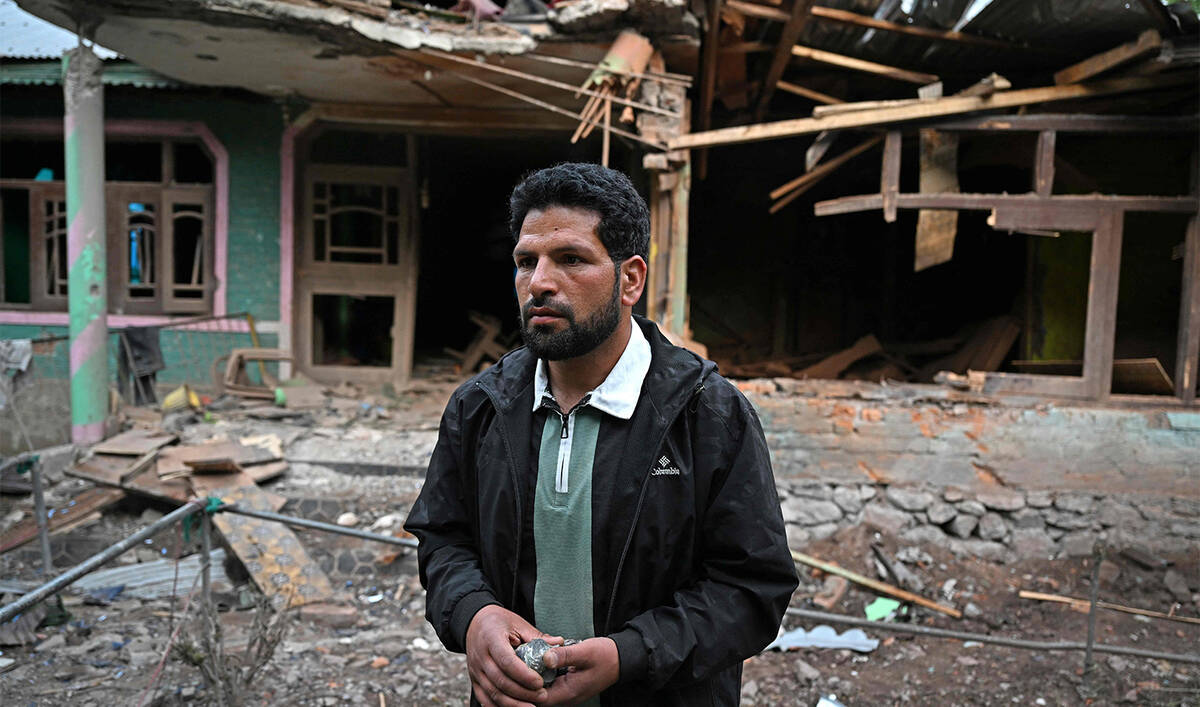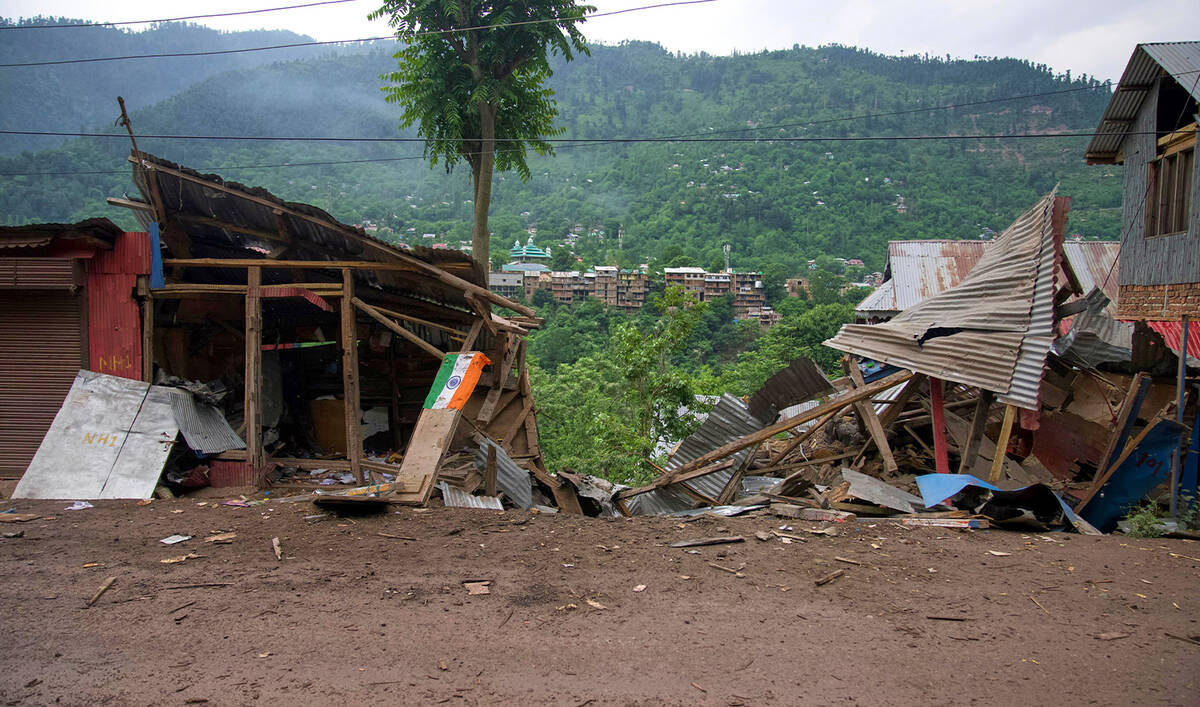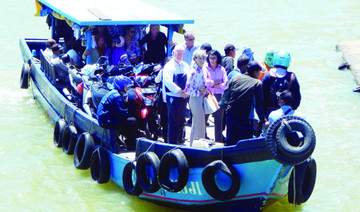CANBERRA: Australia and Indonesia cemented a landmark new defense pact Tuesday, pledging closer cooperation in the Asia-Pacific region as a new leader prepares to take over in Jakarta.
The pact – which includes provisions for joint drills and deployments to each country – was unveiled during Indonesian defense minister and president-elect Prabowo Subianto’s visit to Canberra.
Prabowo takes the reins of the world’s third-largest democracy on October 20.
Speaking after meeting Australian Prime Minister Anthony Albanese, Prabowo said the defense deal represented a “very good outcome” that would be “beneficial to both our countries in the future.”
Aside from defense, Prabowo expressed a wish for Australian cooperation on the economy, agriculture, food security and curbing international drug trafficking.
“We would like to see more Australian participation in our economy,” Prabowo told reporters at Australia’s Parliament House.
“I am determined to continue this good neighbor relationship... Australia plays a very important role for us.”
Since being elected in February, the ex-special forces commander has also visited China and Japan, displaying a keener interest in foreign affairs than incumbent Joko Widodo.
During Widodo’s decade-long tenure, he never attended the UN general assembly in New York, rarely spoke a foreign language and was regularly chided for taking little interest in foreign affairs.
On Tuesday, Prabowo said he wanted to follow the “general policies” of his predecessor, but also forge closer ties with Canberra.
“Prabowo is much more interested in international affairs,” said Greg Raymond, a foreign affairs expert from the Australian National University.
“He will look to bring Indonesia into international issues. He’s very confident, he’s very knowledgeable, and he’s very comfortable in international settings.”
Australian Defense Minister Richard Marles said the defense pact was one of the most significant agreements ever negotiated between the two nations.
Australia also hopes to cement close ties as the region is riven by rivalry between China and the United States.
Separated by less than 300 kilometers (186 miles) at their closest point, Indonesia and Australia have charted different courses while navigating those geopolitical upheavals.
Canberra has drawn ever nearer to longtime ally the United States, bolstering its military in an attempt to deter the might of a rising China.
Jakarta has meanwhile walked a more neutral path, wary of drawing too close to Washington and far less willing to needle Beijing.
The defense agreement has been in train since February last year, but the details remain under wraps for now.
Analysts anticipate maritime cooperation will be a focal point – a hot topic given unresolved tensions in the South China Sea.
“It’s very much about the practical arrangements, making military exercises and cooperation easier,” Raymond said.
“It might also cover logistics. So the traveling country can use the other’s facilities, ammunition, logistics support and similar things.”
Trade between Australia and Indonesia meanwhile remains far trickier terrain.
A flood of cheap Indonesian nickel threatens to crash international prices and all-but wipe out a once-profitable Australian sector.
Indonesia and Australia are the world’s two biggest thermal coal exporters, and both are anxious to shed their economic reliance on polluting fossil fuels.
While nickel remains a point of tension, there are other areas – such as electric vehicle manufacturing – where opportunities abound.
Indonesia’s president-elect Prabowo visits Australia, unveils defense pact
https://arab.news/j5e7t
Indonesia’s president-elect Prabowo visits Australia, unveils defense pact

- Prabowo Subianto takes the reins of the world’s third-largest democracy on October 20
- ‘I am determined to continue this good neighbor relationship... Australia plays a very important role for us’
Cyprus court jails Hungarians brokering property sales in Turkish-held north
Friday’s verdict highlights the complexity and sensitivity over territory in Cyprus
NICOSIA: A court in Cyprus sentenced two Hungarian nationals to prison on Friday for brokering sales of properties in the Turkish-held north of the island seized from fleeing Greek Cypriots in a 1974 war.
The two women were convicted of advertising and finding buyers for coastal properties without the consent of the registered owners in the territory, which is a Turkish Cypriot state recognized only by Turkiye.
Friday’s verdict, likely to draw the ire of Turkish Cypriots, highlights the complexity and sensitivity over territory in Cyprus, where thousands of people lost property and homes from internal displacement and a 1974 Turkish invasion triggered by a brief Greek-inspired coup.
Those properties have since been re-distributed, and bought and sold many times. The territory has recently seen a surge in high-end investment.
Cyprus’s Criminal Court passed down sentencing of 2.5 years and 15 months jail to the two women, the semi-official Cyprus News Agency (CNA) reported. They had pleaded guilty to a number of charges, and prosecutors suspended others.
The court is based in the southern part of Cyprus run by its internationally recognized Greek Cypriot government. The women were arrested late last year after arriving in the south.
Greek Cypriot authorities have increasingly pursued legal action against foreign nationals investing in disputed properties in north Cyprus in recent years, and the issue is known to have caused friction in attempts to relaunch peace talks.
Two other cases are pending before the courts.
Jordanian Deputy Prime Minister highlights importance of ties with Japan

- Chief Cabinet Secretary Hayashi stated that Japan is committed to continuing its efforts toward a two-state solution for Palestine
- Iwaya stated that Jordan is playing an important role amid the fluid international situation
TOKYO: Jordanian Foreign Minister and Deputy Prime Minister Ayman Al Safadi met with Japanese Foreign Minister Iwaya Takeshi and Chief Cabinet Secretary Hayashi Yoshimasa in Tokyo on Friday and highlighted the importance of the partnership between Jordan and Japan, Japan’s Foreign Ministry reported.
Chief Cabinet Secretary Hayashi stated that Japan is committed to continuing its efforts toward a two-state solution for Palestine and establishing peace and prosperity in the region in coordination with Jordan, which, he said, was a vital part of stability in the region.
Iwaya welcomed his Jordanian counterpart and appreciated the visit to Japan and the Osaka-Kansai Expo of Crown Prince Hussein, who had “fruitful discussions” with Prime Minister Ishiba Shigeru on Thursday.
Iwaya stated that Jordan is playing an important role amid the fluid international situation and added that he hopes to work closely with Jordan toward achieving a “two-state solution” for Palestine and establishing long-term peace and stability in the region.
The two foreign ministers met previously in Munich and Iwaya said the high-level visits and meetings “symbolize the strategic partnership between our two countries.”
He also offered condolences for those affected by the flooding in Petra.
Foreign Minister Safadi said he appreciated support from Japan in various fields, including economic reforms. He also congratulated Japan on the success of the Osaka-Kansai Expo.
He explained the latest regional situation and Jordan’s diplomatic efforts and stated that Jordan attaches great importance to cooperation with “close partner” Japan. He also expressed his gratitude for the assistance Japan has extended to Jordan thus far.
He added that he was looking forward to “in-depth discussions about the challenges we face in the region, particularly efforts to stop the Israeli aggression in Gaza and to confront the massive humanitarian disaster it is suffering, in addition to discussing the situation in Syria and the situation in the region in general.”
“We emphasize the importance of Japan’s role,” he said. “Japan is highly respected in our region, and Japan’s policies are aimed at achieving security, stability, peace and development. These are also the goals of our policies in Jordan.”
Discussions centered on bilateral cooperation and various issues in the Middle East.
Putin and Trump exchanged World War Two anniversary greetings via aides, Kremlin says

- “These were warm words, mutual congratulations on our common great celebration,” Ushakov said
- Russia marked the anniversary on Friday
MOSCOW: Russian President Vladimir Putin and US President Donald Trump congratulated each other via their aides on the 80th anniversary of the Soviet and allied victory in World War Two over Nazi Germany, the Kremlin said on Friday.
’Through their aides, the Russian president and President Trump exchanged congratulations on the occasion of our common celebration,” Yuri Ushakov, a foreign policy adviser to Putin, told state TV’s Channel One.
“These were warm words, mutual congratulations on our common great celebration,” Ushakov said.
Russia marked the anniversary on Friday with a military parade on Moscow’s Red Square attended by dozens of world leaders, including China’s Xi Jinping.
The TASS state news agency reported that Lynne Tracy, the US ambassador to Russia, had not been present at the parade.
Weary border residents in Indian-administered Kashmir struggle to survive

- Villagers hid in bunkers, behind rocks and bushes on mountain slopes, many watched their homes being reduced to rubble
- Exchange of heavy fire has destroyed or severely damaged dozens of homes along the border, forcing many to flee
URI, India: Mohammad Naseem says his neighbors laughed when he borrowed money and built a concrete bunker under his home in a village near the disputed Kashmir border.
But this week, when mortar bombs rained in Salamabad, 38 people — men, women, and children — huddled in it as about a dozen shells exploded outside in quick succession.
One of them destroyed Naseem’s home.
“Many of us would have died had we not moved into the bunker,” Naseem, a 34-year-old hotel chef, told AFP.
“We grabbed our children and rushed inside. It got so packed that after some time we felt suffocated, two of our children became unconscious,” he said.
“The children had to be hospitalized after daybreak when the shelling stopped.”

Other villagers hid behind rocks and bushes on the mountain slopes. Some watched their homes being reduced to rubble.
Deadly confrontations between nuclear-armed India and Pakistan erupted after New Delhi accused Islamabad of backing an April 22 attack on tourists on the Indian-administered side of the disputed territory, which killed 26 people.
Pakistan denies the charge.
“We took our children out and went up the mountain slope holding them tightly as bombs exploded around us,” Naseer Ahmed Khan, 50, said outside his damaged house on Thursday.
“Our life is worth nothing. At any time, entire families could be wiped out,” Khan said. “Our children are not able to sleep and we cannot have a meal in peace.”
The exchange of heavy fire has destroyed or severely damaged dozens of homes in Uri, about 100 kilometers (66 miles) from the Kashmir capital Srinagar, forcing many to flee to safer areas in towns like Baramulla, about 50 kilometers away.
Sajjad Shafi, a local lawmaker told AFP that about 10 percent of Uri’s population — some 22,000 people — fled since the latest fighting began.
On Friday, many more were fleeing in buses and trucks provided by the government or driving off in their own cars.
“How can we stay here?” Rubina Begum said outside her destroyed home. “The government should lodge us somewhere safe.”

Begum’s daughter, Saima Talib, added: “We have nothing left except the clothes we are wearing.”
Displaced people are struggling to find food and work and many are now sheltering in government buildings in Uri.
Mohammad Lateef Bhat, a road construction worker, said: “I work as a laborer with army’s border roads organization but their work also stopped.”
“This morning I came to the market looking for work but there is nothing,” Bhat said.
Some vegetable sellers briefly set up shop before closing.
Mohammad Bashir was also despondent.
“I came to the market to find some work so I can buy some food for my family (of eight) but there is nothing,” Bashir, 60, said.
The death toll from India and Pakistan’s biggest clashes in decades passed 50 on Friday with each accusing the other of staging drone attacks in waves.
Farooq Ahmed Khan, 35, a bus driver from Sultandhaki village near the border, said “this fighting has made our life miserable.”
Nagni, a rare mixed settlement of Muslims, Hindus and Sikhs, sits on mountain slopes near the Indian army’s border headquarters in Uri.
Villagers say 35 of the 50 families there have fled.
Badal, a 22-year-old student who only gave his first name, was cleaning up after his sister’s wedding at his freshly painted home.
He showed a crater caused by a mortar bomb that landed a few meters away on the night of the wedding.
“Luckily there was no loss of life but a lot of damage. What we need.. is bunkers, but there are none.”
“This village has always been a target of Pakistani attacks in the past because the (Indian) army headquarters are nearby,” said Sahil Kumar, another Nagni resident.
Locals say they are fed up.
“I say there should be a war just to decide where Kashmir goes,” said Farooq Ahmed Khan, the bus driver.
“I will also go to fight in that war so that this trouble ends for good,” Khan said.
Kyiv’s EU allies endorse tribunal to try Russian leaders

- “Russia’s aggression cannot go unpunished and therefore establishing this tribunal is extremely important,” EU top diplomat Kaja Kallas said
- The new tribunal is not expected to be able to try Putin while he is in office
LVIV, Ukraine: Ukraine’s EU allies on Friday endorsed the creation of a tribunal to try Russia’s top leaders over the invasion, as Kyiv pushes for Vladimir Putin himself to be brought to justice.
EU foreign ministers were gathering in the western Ukrainian city of Lviv in a symbolic show of support on the same day Russia commemorates the end of World War II with a grand military parade in Moscow.
European efforts to create the tribunal appear to have sped up since US President Donald Trump returned to the White House, courting Putin in a bid to end the war and raising fears Moscow could escape justice for good.
“There is no space for impunity. Russia’s aggression cannot go unpunished and therefore establishing this tribunal is extremely important,” EU top diplomat Kaja Kallas said.
The International Criminal Court (ICC) in the Hague has already issued arrest warrants for Putin and other Russian officials for the forced deportation of children and strikes on Ukraine’s energy targets.
But the ICC doesn’t have the jurisdiction to prosecute Russia for the more fundamental decision to launch the invasion in the first place.
However, the new tribunal is not expected to be able to try Putin while he is in office due to a principle of international law that gives immunity to presidents, prime ministers and foreign ministers.
“This tribunal is being set up to pass appropriate sentences in the future,” Ukrainian Foreign Minister Andriy Sybiga said in Lviv.
He added Kyiv wanted the “inevitable punishment for all,” including the “president of Russia, the prime minister of Russia and the foreign minister of Russia.”
Putin earlier on Friday had evoked Soviet victory over Nazi Germany to rally the country round his three-year offensive at a grand military parade in Moscow in front of key allies, including China’s Xi Jinping.
There are fears in Ukraine that Russian officials may escape justice, especially after Trump initiated a rapprochement with Putin in the hopes of ending the war.

















